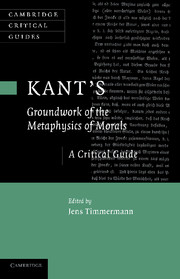Book contents
- Frontmatter
- Contents
- List of contributors
- List of translations and abbreviations
- Introduction
- 1 Ethics and anthropology in the development of Kant's moral philosophy
- 2 Happiness in the Groundwork
- 3 Acting from duty: inclination, reason and moral worth
- 4 Making the law visible: the role of examples in Kant's ethics
- 5 The moral law as causal law
- 6 Dignity and the formula of humanity
- 7 Kant's kingdom of ends: metaphysical, not political
- 8 Kant against the ‘spurious principles of morality’
- 9 Autonomy and impartiality: Groundwork III
- 10 Problems with freedom: Kant's argument in Groundwork III and its subsequent emendations
- 11 Freedom and reason in Groundwork III
- Bibliography
- Index
1 - Ethics and anthropology in the development of Kant's moral philosophy
Published online by Cambridge University Press: 04 August 2010
- Frontmatter
- Contents
- List of contributors
- List of translations and abbreviations
- Introduction
- 1 Ethics and anthropology in the development of Kant's moral philosophy
- 2 Happiness in the Groundwork
- 3 Acting from duty: inclination, reason and moral worth
- 4 Making the law visible: the role of examples in Kant's ethics
- 5 The moral law as causal law
- 6 Dignity and the formula of humanity
- 7 Kant's kingdom of ends: metaphysical, not political
- 8 Kant against the ‘spurious principles of morality’
- 9 Autonomy and impartiality: Groundwork III
- 10 Problems with freedom: Kant's argument in Groundwork III and its subsequent emendations
- 11 Freedom and reason in Groundwork III
- Bibliography
- Index
Summary
In the Groundwork of the Metaphysics of Morals of 1785, Immanuel Kant sharply distinguishes moral philosophy from anthropology, claiming that the metaphysics of morals must precede practical anthropology, must be completely a priori, and must therefore be ‘purified’ or ‘cleansed’ of anything empirical, a posteriori, or belonging to mere anthropology (G IV 388). The rudiments of the a priori moral philosophy expounded in the Groundwork are extensively explained and analysed in the two other major works that are explicitly concerned with moral philosophy, the Critique of Practical Reason (1787) and the Metaphysics of Morals (1797). The a posteriori or empirical doctrine of morals or what is ‘called more specifically practical anthropology’, by contrast, never really comes into focus in the published works. Even the Anthropology from a Pragmatic Point of View contains little that would directly concern moral philosophy. Reflections on the empirical and anthropological aspects of morality can, however, be found in the student notes of his lectures on moral philosophy given before 1785, that is, before the publication of the Groundwork, and, more importantly, in those of the lectures on anthropology, which Kant began to offer in the winter semester of 1772–73 with the hope of transforming the subject into a proper academic discipline. Kant's main goal in this new collegium privatim was, as he put it, to ‘introduce all the sciences that are concerned with morals, with the ability of commerce, and the method of educating and ruling human beings, or all that is practical’ (X 145).
Keywords
- Type
- Chapter
- Information
- Kant's 'Groundwork of the Metaphysics of Morals'A Critical Guide, pp. 7 - 28Publisher: Cambridge University PressPrint publication year: 2009
- 4
- Cited by



